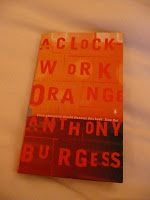 This is one of those books I've been wanting to read for a long long time. I heard about it when I was in uni from a course-mate, who swore it was incredible.
This is one of those books I've been wanting to read for a long long time. I heard about it when I was in uni from a course-mate, who swore it was incredible.
A Clockwork Orange by Anthony Burgess doesn't disappoint and is a real horrorshow of a book. Narrated by Alex, who speaks with the Natsat slang, the initial pages you are trying to work out what the various words mean. But after a while you get the hang of it, and become real horrorshow. With his malchicks and devotchkas, droogs, moloko plus, veshches and all that cal.
The Ludovico Technique mentioned in the book bascially creates negative associations to ultra-violence, and any violence at all in fact, though conditioning. In their effort to employ aversion therapy on Alex, and make him sick with nausea to the point that he'd rather die when seeing/experiencing any violence at all, Alex becomes much like one of Pavlov's dogs, unthinkingly reacting to stimuli. This is one of the questions raised in the book - is a human still human if he has no choice. Even though Alex is now incapable of doing evil, and is thus socially acceptable and law abiding, is it morally right for the state to create a clockwork orange? To deprive him of choice?
On a larger scale, the clockwork occurs on a societal level in general. In the last chapter, Alex ruminates about his life since leaving prison, and finds that in all likelihood, even though he grows out of his enjoyment of ultra-violence, the next generation of youths, and the next and the next, will also go through that whole stage. It cannot be helped, and will go on to the end of the world - like clockwork. A rather bleak picture, but on a less extreme scale, doesn't that already happen now? The young have to still learn by making their own mistakes, even if their parents warn them and tell them the dangers. One has to go through the whole period of "growing up".
Another interesting thing I found was the balanced point of view the book gives. That while the state was painted in the most horrible light, attempting to use inhuman techniques to rehabilitate criminals, the opposition was no better. When Alex was released from prison, and came across people who were strongly opposed to the ways of the government, they themselves were no better. They wanted to use Alex as a symbol of the state's evil, but they felt he didn't look ragged or tortured enough. They wanted to make him worse, to give their cause that extra oomph. They played on his weakness (which only came about because of the "rehab") and drove him to the point where he tried decided to commit suicide. What better headline than "Government Drives Man to Suicide"?
It is clear to see that one can go too far in fighting for a cause, and forget the person at the heart of it. Alex kept asking "what about me?", a question which was promptly ignored by all sides. After being a symbol, after the fighting, what happens to the person? I think that is a question that must seriously be grappled with.
The book is excellent in that it doesn't give you answers straight out, but really provokes you to think about polemical issues like morality, choice, power and control, etc.
A highly recommended read.

No comments:
Post a Comment